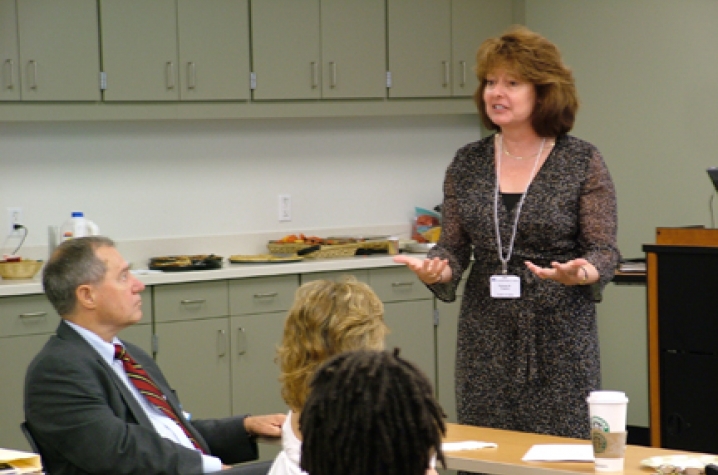Working to Prevent Elder Abuse

LEXINGTON, Ky. (Oct. 12, 2009) — Pamela B. Teaster has served as the chair of the Graduate Center for Gerontology/Department of Gerontology at the University of Kentucky College of Public Health for over a year and has made a huge impact since her arrival on campus. She serves on several national committees and has conducted invaluable research during her tenure at UK.
Teaster is president of the National Committee for the Prevention of Elder Abuse. Earlier this year she was instrumental in establishing UK's Justice Center for Elders and Vulnerable Adults. The center is a collaborative effort that draws upon the significant strengths of researchers and practitioners dedicated to elder justice in the Commonwealth.
The statewide interdisciplinary center will work to address a variety of topics including elder abuse, guardianship, end-of-life decision making, access to health care and a living wage, and quality of life issues. The center is dedicated to research and educational efforts that measurably improve the lives of Kentucky elders, as well as vulnerable adults and their families.
"The Justice Center is the next and most important endeavor in the Commonwealth of Kentucky to address issues of the rights of elders and vulnerable adults," Teaster said. "It is a center whose time has come and that seeks to improve justice all across the state and involving the best minds possible.”
Teaster's efforts have not gone unnoticed by her peers. She was recently among 53 senior women faculty selected for the 2009-2010 class of fellows in the Hedwig van Ameringen Executive Leadership in Academic Medicine (ELAM) Program for Women at Drexel University College of Medicine. ELAM is the only national program dedicated to preparing senior women faculty for leadership at academic health centers. The new fellows represented 49 medical, dental, and public health schools.
During their year with ELAM, fellows gain a broader and deeper knowledge of the challenges facing academic health centers through meetings with national leaders in the field, interactions with their peers in the program, and interviews with a wide range of senior officers at their own institutions. Fellows also undertake a long-term project that addresses an institutional need or goal while providing an opportunity for leadership and greater visibility.
ELAM’s mission is to increase the number of women in senior leadership positions, and, in so doing, to change the culture of academic health centers to become more inclusive of different perspectives and more responsive to changing social agendas. Some 20 percent of its 569 graduates currently serve in the highest-level leadership ranks, from associate dean through university president, including five of the 15 current women deans at U.S. medical schools, five of the 13 women deans at U.S. dental schools, and two of 12 women deans at U.S. public health schools. In medical schools, 24 percent of women department chairs and 27 percent of associate and vice deans are ELAM graduates.
"I am humbled to be part of such a distinguished group of women from across the country and world," said Teaster. "With the knowledge and insight I gain, I hope to become a better leader of my center, other organizations in which I have a leadership role, as well as a better mentor."
Teaster earned her doctorate in Public Administration and Public Affairs and the Graduate Certificate in Gerontology from Virginia Polytechnic Institute and State University. She recently served on the American Bar Association Commission on Law and Aging and on the Board of Trustees for the National Guardianship Foundation. Teaster is also a previous recipient of the Rosalie Wolf Award for research on elder abuse and a former editor of the Journal of Elder Abuse and Neglect.
Teaster continues to conduct work for the betterment of vulnerable adults. Among her several ongoing research projects she is exploring linkages between poverty and elder abuse, as well as a study about the prevalence of nursing home abuse. She has recently conducted a national survey of elder and vulnerable adult abuse, public guardianship systems, and the sexual abuse of vulnerable adults in institutions. Teaster is the author of over 70 peer-reviewed articles, reports, books, and book chapters and serves as president of both the National Committee for the Prevention of Elder Abuse and the Kentucky Guardianship Association.
“I try to improve the human condition by research, teaching, and service directed toward improving the quality of life and death for vulnerable adults," Teaster said . "I am willing to be working early and late, traveling across the country and abroad all the time pursuing what I believe to be the most important issues of our time.”




